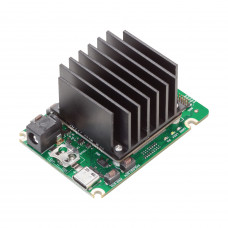OAK-FFC-6P
Overview : The OAK-FFC-6P baseboard has 6 FFC interfaces which allows for six 2-lane MIPI camera modules. It is the first device from OAK Series 3 (Keem Bay VPU) and uses the OAK-SoM-Max.
To see which cameras are compatible with this OAK FFC baseboard, see the guide here: OAK FFC camera modules. Some of camera modules have a M12 mount, so you can use different lenses to get custom FoV (with wide or narrow FOV M12 lenses).
This board is also compatible with RPi camera interface. For that you will need a FFC from Arducam, which converts 26-pin Luxonis camera pinout to 22 pin RPi camera pinout.
In addition, IMU (over SPI) sensor is also added to this OAK FFC board.
Keem Bay inside : This OAK device has on-board Keem Bay VPU. Main features:
3.0 TOPS for AI - around 10x AI boost compared to Myriad X
Imaging: ISP, max 6 cameras, 500 MP/s HDR, 3A
Run any AI model, even custom architectured/built ones - models need to be converted.|
Encoding/Decoding: H.264, H.265, MJPEG - 4K/30FPS, 1080P/60FPS
Computer vision: warp/dewarp, resize, crop via ImageManip node, edge detection, feature tracking. You can also run custom CV functions
Stereo depth perception with filtering, post-processing, RGB-depth alignment, and high configurability
Object tracking: 2D and 3D tracking with ObjectTracker node
Key features :
6x 2-line MIPI camera interfaces (all of the CCMs supported in DepthAI can run on 2-lane MIPI, most of them also in full resolution)
OAK-SoM-Max connected to the baseboard
5V power input via barrel jack
USB 3.1 Gen 1 Type-C
IMU support (BMI270 by default, footprint for BNO086)
uSD card slot
Onboard EEPROM
Pads for DepthAI SoM 1.8V SPI
Pads for DepthAI SoM 1.8V Aux Signals (I2C, UART, GPIO)
PSRBS connector (5V, STROBE, RST, BOOT_SEL, FSIN_ALL, FSIN_STEREO)
1025 coin battery holder
Design files produced with Altium Designer 22
Minimal and maximal perceiving distances of the camera : Minimal depth perceiving distance of the camera depends on mono camera FOV, resolution, baseline and stereo depth mode. Since this device has modular mono cameras, you can choose a custom stereo baseline (depending on how it is set up). When using OAK-FFC-OV9282, the formulas for min/max depth perceiving distances are:
Min distance (800P) = 882.5 * baseline / 95
Min distance (400P) = 441.25 * baseline / 95
Min distance with extended disparity (800P) = 882.5 * baseline / 190
Min distance with extended disparity (400P) = max(441.25 * baseline / 190, 19.6)
Max percievable distance (using subpixel) = baseline/2 * tan((90 - 71.9/1280) * PI/180)
For more information about the maximum distance see the Stereo Depth documentation.
Getting started : The OAK-FFC-6P accepts 5V (+/-10%) from a 5.5m x 2.5mm barrel jack, and interfaces to a host via USB 3.1 Gen1 Type-C. With cameras and the OAK-SoM-Max, total power consumption usually stays below the 1.5 A specification, Type-C power of 1.5 A or greater is recommended.
Interfacing with the OAK-SoM-Max is also possible with OAK-FFC-6P connector pads QSPI, and AUX. These pads are designed for the Amphenol/FCI 20021121-00010T1LF or equivalent. Please refer to the schematics for pinout information.
The reset button soft resets the Luxonis DepthAI SoM only, SYS-RST button resets the power system of the DepthAI and PWR button is a GPIO button that can be used to turn off/on the SoM. BOOT button is meant to be used only for recovery purposes changing GPIO boot mode to eMMC recovery when the button is held on system power up.
The PG LED indicates 5V power is present and all outputs of the DC-DC converters are inside the specified nominal voltages. The LED1 indicates “BOOT” status of the DepthAI SoM. The LED2 is an “CONNECT” status LED which indicates that the OAK-SoM-Max is connected to the network/device.
FFC cables : For FFC cables we use Molex series 15166. Along with the OAK FFC board, we ship 26 pin count, same-sided, 152mm cables (part number 151660281). If you would like to use shorter/longer FFC cables.
Enter the code in the box below:

-74x74.jpg)
-74x74.jpg)
-74x74.jpg)
-74x74.jpg)
-74x74.jpg)

